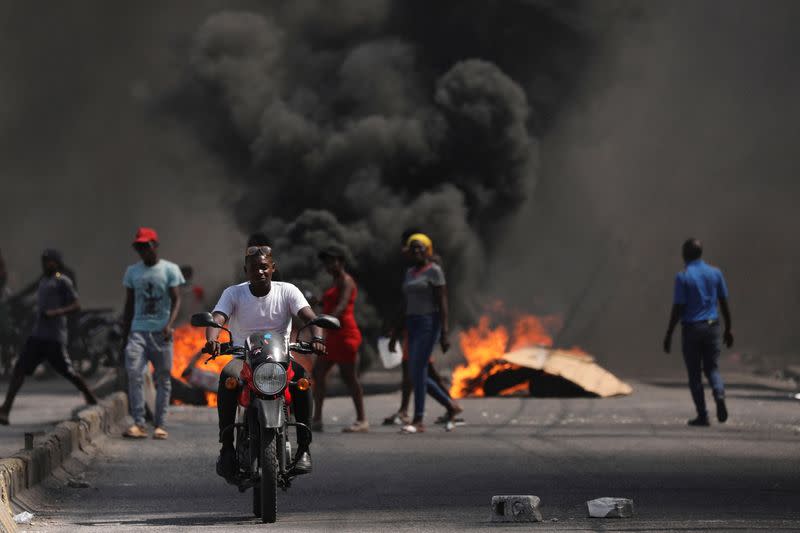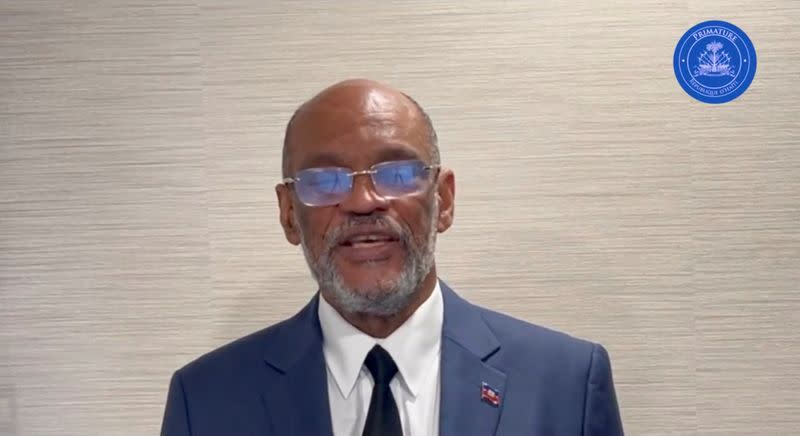Haiti's prime minister resigned. Who will replace him?
- Oops!Something went wrong.Please try again later.
- Oops!Something went wrong.Please try again later.
By Sarah Morland
(Reuters) -Haiti's embattled Prime Minister Ariel Henry announced his resignation late on Monday, effective once a transition council and temporary replacement have been appointed.
HOW DID HENRY RESIGN?
A U.S. official said the decision for Henry's resignation was made on Friday, though he did not officially tender it to his cabinet until Monday evening and later issued an official video address.
Henry had traveled to Kenya in late February to secure support for an international security mission to fight Haiti's powerful armed gangs, but violence in the capital escalated during his absence and left him stranded in the U.S. territory of Puerto Rico.
Widespread protests have called for Henry's resignation. He took power after the 2021 assassination of Haiti's last president, Jovenel Moise, and had postponed elections, citing a lack of security. He had said he would step down by Feb. 7.
Late Friday, heavy gunfire sounded near the capital's National Palace, after days of violence in which armed gangs had broken thousands out of prison, forcing the capital's main cargo port to close and the government to order a state of emergency.
Over the weekend, representatives from Haiti's government as well as opposition groups, the private sector, civil society and religious groups met with leaders from the U.S. and Caribbean Community (CARICOM) to establish a consensus on how to return stability to the island.
WHAT IS THE TRANSITION COUNCIL?
The presidential transitional council will be made up of two observers and seven voting members representing a range of Haitian society, CARICOM chair Irfaan Ali said on Monday.
During the transition, the council will exercise specified presidential powers through majority vote.
It will also appoint an interim prime minister and a cabinet, co-sign orders and establish a provisional electoral council that will be tasked with paving the way to Haiti's first elections since 2016.
Anyone who has been convicted, charged or hit by U.N. sanctions will be barred from membership, as will anyone who opposes the U.N. resolution to deploy a security force to Haiti or intends to run in the next elections.
CARICOM did not give a date for the council appointments nor the elections, though regional leaders have said security must be established before a vote.
WHO WILL BE ON THE COUNCIL?
Although no individuals have been named to the council, CARICOM said the two non-voting observer roles would go to a religious leader and representative of Haiti's civil society.
The seven voting members will be drawn from Haiti's business sector and political parties or coalitions, including a group known as the January 30 Collective, and the December 21 Accord, an organization that had backed Henry's mandate to rule until February 2024.
A member will also be appointed by Fanmi Lavalas, a center-left party led by 70-year-old former President Jean-Bertrand Aristide, the country's first democratically elected president, and who was ousted in a 2004 coup d'etat.
Members will also represent Pitit Dessalines, a party led by former Senator Jean-Charles Moise after he split from Fanmi Lavalas and the Montana Accord, a 2021 grassroots movement that emerged toward the end of Haiti's last presidency.
The last member will represent Committed to Development (EDE), the party of former Prime Minister Claude Joseph, who has been accused of involvement in the assassination of Jovenel Moise, charges he blasted as political persecution.
(Reporting by Sarah Morland in Mexico City, Harold Isaac in Port-au-Prince and Robertson S. Henry in Kingstown. Editing by Gerry Doyle)


